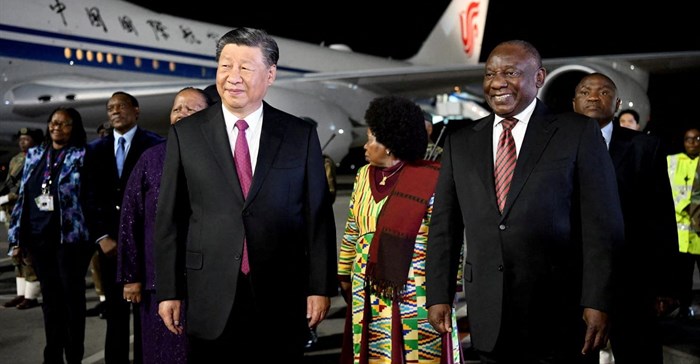
Top stories






More news


Marketing & Media
Ads are coming to AI. Does that really have to be such a bad thing?














Despite these hurdles, Brics2023 offers a platform to explore how collaborative efforts among companies and firms in our economies, driven by the strength of the private sector, can foster growth and prosperity within the bloc.
This was the take-home message of South Africa's Minister of Trade, Industry and Competition, Ebrahim Patel in his headline address at the
Brics2023 summit, which opened its doors to 1,200 delegates from South Africa, Brazil, Russia, India, China, and various African countries on Tuesday morning (22 August 2023).
Patel acknowledged the presence of Cabinet members, deputy ministers from South Africa and distinguished guests, including Dilma Rousseff, the president of the New Development Bank; Fernando Haddad; Brazil's Finance Minister; Wamkele Mene; the Secretary General of the African Continental Free Trade Area, and Rajendra de Sousa, the Minister of Trade from the Republic of Mozambique. He recognised too the heads of the respective Brics business council chambers and Busisiwe Mabuza, the inaugural chair of the South African chapter of the Brics Business Council.
Patel highlighted how global trends are having a significant impact on our economies and societies with a major shift underway in economic activity from traditional Western centres to emerging industrial hubs in the East and South.
This shift is also affecting global demographics, he said.
"It's been 1,850 since we hosted the last Brics summit, and the world appeared simpler then, less volatile, less uncertain; friendlier. It had not yet encountered the damage of the Covid pandemic, nor the deepest recession since the Second World War. Today the world is more polarised, Climate change is more pressing and the speed of technological innovation is actively increasing.
"Change creates turmoil and tensions. As the world changes, we see a rise in unilateralism and a pushback on the global rules. Yesterday, delegates of the Brics Manufacturing Forum met to reflect on the changing world and its meaning for economies. We concluded that these [collective] major trends are driving out the old ways of doing things. Business as usual - is no longer an option."
Patel stressed that when it comes to Africa, legacy is not destiny.
"On the African continent countries have embarked on a courageous step to break the patterns of neocolonialism by building a continental free trade area that will bring together a market of 1.3 billion people which will spur on African industrialisation. Africa is no longer simply a raw material supplier; Africa is taking its place in the world as an innovator, as an industrialised beast.
Patel described a contemporary Africa characterised by its youthful population, fast urbanisation, strong digital connectivity, and high energy levels.
"We are pushing against a toxic colonial legacy of 55 states divided by borders to a continent of 1.3 billion people united in our resolve to act in a unified manner."
He emphasised that the combined economies of all Brics countries contribute over a quarter of the world's annual economic output generated by both dedicated workers and entrepreneurs. This, he said, was complemented by the New Development Bank's driving investment in infrastructure that supports economies and societies that serve as networks of knowledge- and policy exchanges. Here he particularly referred to Africa and how this would accelerate change and development for the continent.
"We are putting forward a worldview that is based on our right to develop; to not live on the charity of others, but to thrive as equals building our economies," he said. "We must make the argument instead for a global trading and investment architecture based on fairness. We must point to the enormous benefits that have been derived by the flow of capital and goods across borders. We must invest and trade in ways that support the efforts of developing countries to industrialise - and to enhance the welfare of citizens and workers
Brics2023, said Patel, aims to unite people from diverse backgrounds and regions, leveraging air travel and digital communication to promote language and culture as tools for economic growth, job creation, and environmental protection on a global scale.
"Our modern world is built on the great civilizations of the past and on the contemporary efforts of scientists of innovators, of entrepreneurs and of policymakers Science and Technology and Innovation has been trained on the world's problems, from the development of vaccines against the Covid virus, to the green technologies that can help to decarbonise the energy mix of the world.
"Hundreds of millions of people have been lifted out of poverty through industrialisation, backed by trade and technological development on the African continent. This is the context of today's Brics meeting. This is what you as business people will take as a framework within which to forge business to business partnerships.
In conclusion, Patel said Brics2023 sets the stage for dialogue and collaboration. By harnessing the power of collaborative endeavors within our economies, steered by the robust private sector, the potential for nurturing growth and prosperity within the bloc is unmistakably promising..
This gathering, he said, not only underscores the shared commitment to overcoming challenges but also amplifies the collective drive to shape a brighter future for the member nations.
Katja Hamilton is at the Brics Summit this week in Johannesburg, reporting live for Bizcommunity.